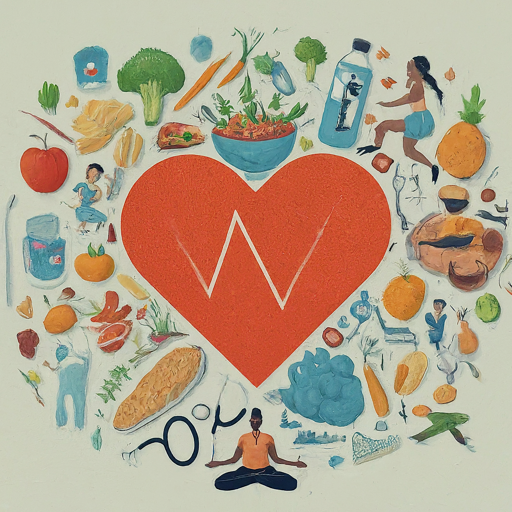Introduction:
Happiness is often seen as the ultimate goal in life. We chase it in our careers, relationships, and personal achievements, but what truly makes us happy? Understanding the essential elements that contribute to happiness can help us lead more fulfilling lives. In this blog post, we will explore the most important aspects of happiness, with a special focus on the vital role healthcare plays in maintaining our well-being.1. Strong Relationships and Happiness
Human beings are social creatures, and strong, meaningful relationships are a cornerstone of happiness. Whether it's with family, friends, or a partner, having a support system provides us with love, security, and a sense of belonging. Investing time and effort into nurturing these relationships can significantly enhance our happiness. Additionally, healthcare services such as mental health counseling and family therapy can help strengthen these bonds.2. Finding Purpose and Meaning in Life
Having a sense of purpose and meaning in life is crucial for long-term happiness. This can come from various sources, such as career, hobbies, or volunteering. Healthcare professionals, such as career counselors and occupational therapists, can support individuals in finding and fulfilling their purpose, ensuring they lead a life that feels meaningful and satisfying.3. Importance of Physical Health
Good physical health is often taken for granted until it's compromised. Regular exercise, a balanced diet, and adequate sleep are essential for maintaining physical health, which directly impacts our mood and energy levels. Healthcare providers play a critical role in this aspect by offering preventive healthcare, regular check-ups, and treatments for various health conditions. Access to quality healthcare services ensures that we can address health issues promptly and maintain our physical well-being.4. Mental Health and Happiness
Equally important as physical health is mental health. Practicing mindfulness, managing stress, and seeking professional help when needed can significantly improve our overall well-being. Mental health services, such as therapy and counseling, are crucial for addressing issues like anxiety, depression, and stress. Healthcare systems that prioritize mental health contribute significantly to the happiness and well-being of individuals.5. Personal Growth and Development
Continuous personal growth and self-improvement are vital for happiness. Setting goals, learning new skills, and challenging ourselves help us build confidence and resilience. Healthcare professionals, including physical therapists and life coaches, can guide and support us in our journey towards personal growth. Embracing a growth mindset, where we view challenges as opportunities to learn, can lead to greater satisfaction and happiness.6. Practicing Gratitude for Well-Being
Practicing gratitude can shift our focus from what we lack to what we have. Regularly acknowledging and appreciating the positive aspects of our lives, no matter how small, can enhance our overall sense of well-being. Healthcare providers can encourage practices like gratitude journaling as part of a holistic health approach to mental health and well-being.7. Achieving Work-Life Balance
Achieving a healthy work-life balance is essential for sustained happiness. Overworking can lead to burnout and negatively affect our relationships and health. Healthcare professionals can offer guidance on stress management and work-life balance strategies. Prioritizing time for relaxation, hobbies, and spending time with loved ones can help us recharge and maintain a positive outlook on life.8. Contribution and Kindness in Life
Helping others and practicing kindness can bring immense joy and satisfaction. Whether it's through small acts of kindness, volunteering, or contributing to a cause we care about, making a positive impact on others' lives can enhance our own happiness. Healthcare workers, through their dedication and compassion, exemplify the profound impact of contributing to the well-being of others.9. Mindfulness and Presence
In our fast-paced world, it's easy to get caught up in worries about the future or regrets about the past. Practicing mindfulness—being fully present in the moment—can help us appreciate the here and now. Techniques such as meditation, deep breathing, and mindful walking can help us cultivate this presence and reduce stress. Healthcare providers can offer resources and support for mindfulness practices, enhancing our overall happiness.Conclusion:
Happiness is a multifaceted and deeply personal experience. While the journey to happiness is unique for each individual, focusing on these key elements can guide us toward a more fulfilling and joyful life. By nurturing our relationships, finding purpose, taking care of our health, and practicing gratitude, we can create a solid foundation for lasting happiness. Remember, happiness is not a destination but a journey, and it's the small, everyday choices that often make the biggest difference.Call to Action:
What aspects of happiness resonate most with you? Share your thoughts and experiences in the comments below. Let's inspire each other to live happier, more fulfilling lives, and remember to prioritize our health along the way!Happiness and Well-Being
Role of Healthcare in Happiness
Strong Relationships and Happiness
Finding Purpose and Meaning in Life
Importance of Physical Health
Mental Health and Happiness
Personal Growth and Development
Practicing Gratitude for Well-Being
Achieving Work-Life Balance
Contribution and Kindness in Life
Mindfulness and Presence
Preventive Healthcare
Mental Health Services
Holistic Health Approach
Stress Management Techniques
Mental Health Counseling
Physical and Mental Well-Being
Healthy Lifestyle Choices
Importance of Regular Check-Ups
Emotional Support Systems



0 comments